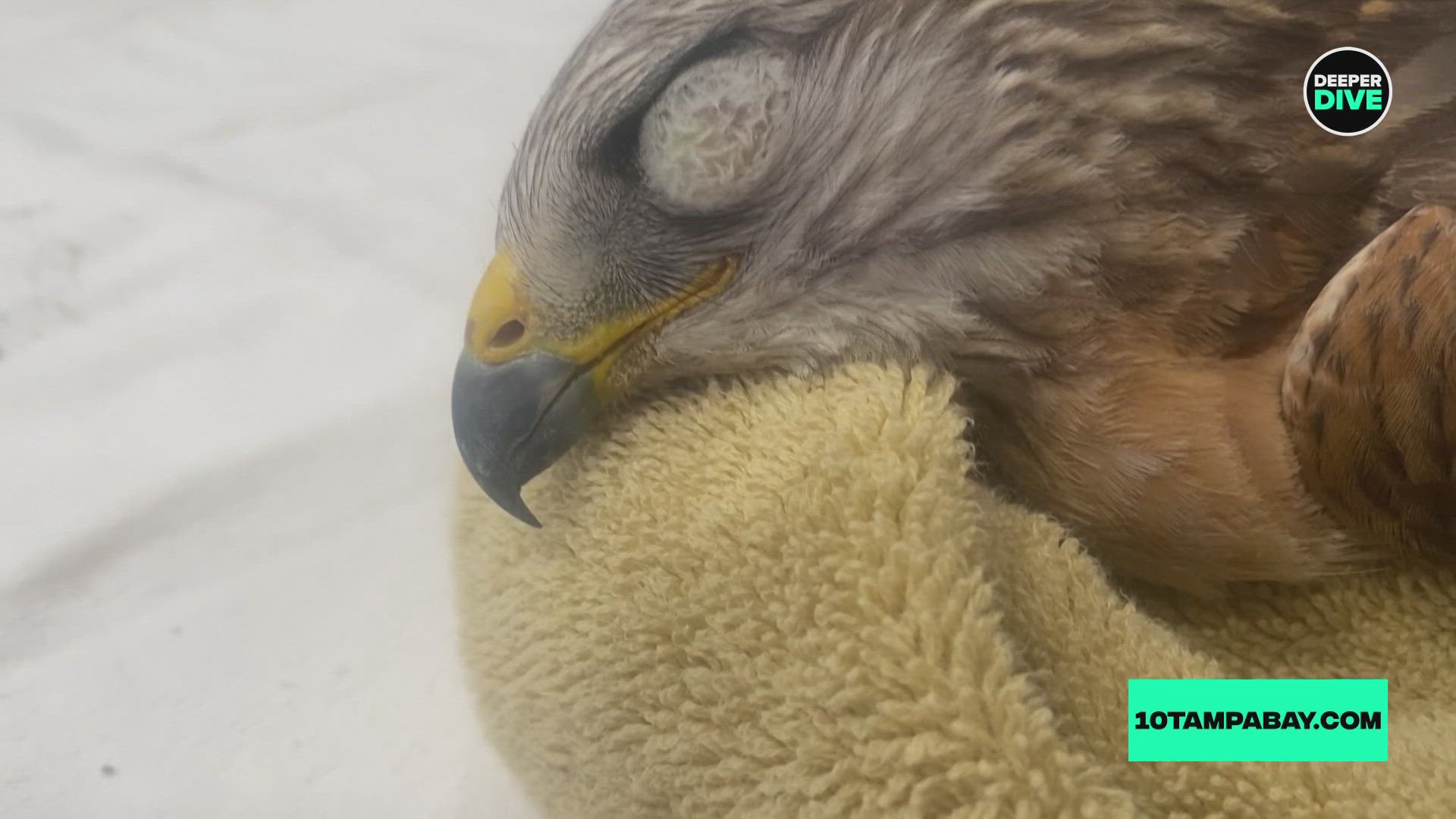SAFETY HARBOR, Fla. — There is a growing movement in the Bay Area to stop using certain kinds of rat poison. It’s not out of concern for the rat but rather the predators that eat the rats.
We’re taking a deeper dive into the effort to save wildlife from these dangerous chemicals, and the advocates who are convincing many to make a change.
It all started two years ago when a family of great horned owls died in Safety Harbor after eating rats with toxic levels of blood-thinning rat poison, or rodenticide. People saw the owls drop dead and became overnight activists, and what started in one city is now spreading across the Tampa Bay area.
Last month, we told you about a family of hawks with telltale signs of rodenticide poisoning — the closing of their third eyelid, the nictitating membrane, making it visible over their eye.
“We're looking for the eyes closing, which for the average person looks like eyes being white glazed over,” said Jonathan Hande, Senior Avian Hospital Technician at Save our Seabirds in Sarasota.
The hawks were part of more than 30 birds of prey the Wildlife Center of Southwest Florida has treated for rodenticide poisoning just this year. Save Our Seabirds took in the adult male while the WCSF took in the chicks. And back in Safety Harbor, activists think a bobcat died in May from eating toxic rats too.
Anticoagulant rodenticides often are put in plastic black boxes on the ground, which are everywhere from apartment and condo complexes, strip malls and big box stores, to homes and neighborhoods.
Cathy Branch Stebbins and Beth Basehore live in Safety Harbor and are rat poison evangelists, volunteering with Birds in Helping Hands by cold-calling businesses and pest control companies. Their pitch is to switch to chemicals that aren’t anticoagulants, which bioaccumulate in animals that eat contaminated rodents.
“When a homeowner or a business loads a black box with these chemicals, they are basically loading a gun,” Branch Stebbins said. “Because you might as well be killing indiscriminately.”
Poisoning from rodenticides is tracked by America’s Poison Centers. Its most recent data from 2022 shows 8,864 cases of humans poisoned by them.
“And it's not just wildlife, it's dogs, it's cats,” says Basehore. “It's kids who play with those boxes end up in the ER, I mean, for a dog or a cat, it's almost a death sentence.”
Six months ago, the EPA published a list of more than 130 endangered species harmed by rodenticides, with 73 it says are being pushed to extinction, including the Florida panther.
Aaron Stewart does not have a rat problem at Southern Fresh, also in Safety Harbor. But as part of rodent prevention, he has the black boxes around his restaurant.
“No rodents in our restaurants!” he says. “[But] if there is any way one of these raptors got a rodent that was treated with our bait, I would feel terrible.”
About three months ago, he reached out to Birds in Helping Hands, which is part of the broader coalition, asking for help making a switch to a different rodenticide with his pest control company, but not without some hesitation.
“My concerns were, ‘if it doesn't have the same effect, then what if we did have a problem?’” he says. “’What if using a different bait wasn't effective and let a problem develop?’ Which, you know, we can't have in this industry.”
Trevor Brindley with SWAT Exterminating Company in Clearwater said helping Stewart make the switch was easy. In fact, SWAT doesn’t use any anticoagulant rodenticides at all anymore.
“After we started losing wildlife, at least for our company, we're all sportsmen, we're all fishermen,” he says. “This is something that we hold near and dear to our hearts. We don't want to hurt animals that are not affected, that are not a nuisance pest.”
Other cities are taking action too.
St. Pete is the only city around that offers pest control services for residents. Late last year, after a push from local advocates and councilmember Gina Driscoll, they switched from an anticoagulant rodenticide to corn glucose, which makes rats stop drinking water, and die from thirst.
“Now I’m happy to report that we have made the switch over to the less harmful ingredient,” Driscoll said at a September 2023 committee meeting.
Mike Stott helped lead the citizen effort as a volunteer with Boyd Hill Nature Preserve.
“It literally happened, if not later that day, the next day, Gina sent a text brings tears to my eyes,” he says. “I work with these birds. They're amazing creatures. They actually do have little personalities. It's not something you notice unless you work with them on a daily basis.”
The coalition also has a vendor list of nearly certified pest control companies and other businesses they’ve worked with that committed to using non-anticoagulant rodenticides.
“I would say that bringing a community together around a common goal and a common value is a community-building thing,” Branch Stebbins said. “It builds the spirit of a community, and it builds the identity and the values of a community.”
And in the past few weeks, they convinced property managers for Ameritech Community Management, which manages thousands of units in west central Florida, to talk to home and condo owner boards about switching rodenticides, marking the biggest win for these advocates so far in their quest to save our predators.

